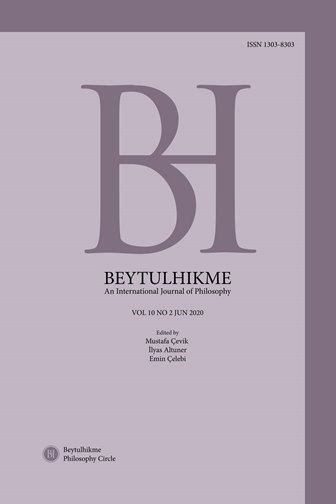Author :
Abstract
Fenomenoloji, en genel anlamda, bilincin dünya ile nasıl ilişki kurduğunu soruşturan bir felsefi projedir. İdealizmin bıraktığı izler klasik döneme dek geriye doğru takip edildiğinde, bu problemin yeni olmadığını, felsefe tarihi boyunca farklı terminolojiler içinde karşımıza çıktığını görüyoruz. Sözgelimi Kant’ın teorik felsefesi bu problemle en iddialı bir biçimde yüzleşmenin örneğiydi. ‘Sentetik a priori’ problemiyle ilgili sonraki tartışma, temelde Kant’ın duyusal ve düşünsel dünya arasındaki bağı kurma tarzından ileri geliyordu. Fenomenoloji, modern kullanımı içinde, bir adım daha öteye sıçramayı deniyor ve dünya ile bilincin etkileşimine odaklanıyor. Fenomenoloji temelde psikolojizme Edmund Husserl (1859-1938) tarafından gösterilen tepkinin ürünüdür. Ona göre psikolojizm, Avrupa bilimlerinin entelektüel bunalımının sorumlusudur. Bu yazıda, bu iddianın tarihsel ve bilimsel arka planını anlatıp, Husserl’in kriz analizinden hareketle fenomenolojinin temellerini göstermeyi deniyorum.
Keywords
Abstract
In the most general sense, phenomenology is a philosophical project that investigates how consciousness is related to the world. By tracing the tracks of idealism back to the classical period, we see that the problem is not new; i.e. we identify the problem in different terminologies throughout the history of philosophy. For instance, Kant's theoretical philosophy constitutes the very example of, the most ambitious confrontation with this problem. The following discussion, about the problem of synthetic a priori, was based on Kant’s attitude which makes a connection between the sensual and intellectual world by Kant. Phenomenology, in modern usage, tries to jump one step further to focus, the interaction of world and consciousness. Phenomenology, fundamentally, emerges from Edmund Husserl’s (1859-1938) reaction to psychologism. Husserl asserts that psychologism is responsible for the intellectual crisis of European sciences. In this paper, I show the historical and scientific background of this assertion and attempt to show the foundations of phenomenology by means of Husserl’s analysis of the crisis.
Keywords
- Beiser, F. C. (2014). After Hegel: German Philosophy, 1840-1900. Oxford: Princeton.
- Carr, D. (1970). Translator's Introduction. E. Husserl, The Crisis of European Scien- ces and Transcendental Phenomenology. Evanston: Northwestern, xv-xliii.
- Cassirer, E. (1999). Das Erkenntnisproblem in der Philosophie und Wissenschaft der
- Cassirer, E. (2007). Die ‘Tragödie der Kultur’. Aufsätze u. Kleine Schriften [1941- 1946]. Gesammelte Werke (ECW), Bd. 24. Hamburg: Meiner.
- Coffa, J. A. (1991). The Semantic Tradition from Kant to Carnap to the Vienna Station. Cambridge: Cambridge University Press.
- Friedell, E. (1999). Antik Yunan’ın Kültür Tarihi. (Çev. N. Aça). Ankara: Dost.
- Heelan, P. A. (1987). Husserl's Later Philosophy of Natural Science. Philosophy of Science, Vol. 54 (3), 368-390.
- Husserl, E. (1970). The Crisis of European Sciences and Transcendental Phenomenology. (Trans. D. Carr). Evanston: Northwestern, 269-299.
- Husserl, E. (1971). Philosophie als strenge Wissenschaft. Frankfurt: Klostermann.
- Husserl, E. (1992a). Logische Untersuchungen. Zweiter Band. I. Teil. Untersuchungen zur Phänomenologie und Theorie der Erkenntnis. Hamburg: Meiner.
- Husserl, E. (1992b). Die Krisis der europäischen Wissenschaften und die transzendentale Phänomenologie. Hamburg: Meiner.
- Kant, I. (1968). Kritik der reinen Vernunft. Kants Werke Akademie Textausgabe, IV. Berlin: Walter de Gruyter.
- Klawiter, A. (2004). Why did Husserl not Become the Galileo of the Science of Consciousness. Poznań Studies in the Philosophy of the Science and the Humanities, 82, 253-271.
- Luft, S. (2004). A Hermeneutik Phenomenology of Subjective and Objecktive Spirit: Husserl, Natorp, and Cassirer. The New Yearbook for Phenomenology and Phenomenological Philosophy IV, 209-248.
- Moran, D. (2012). Husserl’s Crisis of the European Sciences and Transcendental Phenome- nology: An Introduction. Cambridge: Cambridge University Press.
- Patočka, J. (2015). Edmund Husserl’s Die Krisis der europäischen Wissenschaften und Die transcendentale Phänomenologie. The Phenomenological Critique of Mathematisation and the Question of Responsibility. (Eds. Ľ. Učník, I. Chvatík & A. Williams). New York: Springer.
- Valery, P. (2004). Zihnin Krizi. (Çev. E. Özdoğan). Cogito, 39, 100-122.
- Zweig, S. (2015). Dünün Dünyası. (Çev. K. Eğit & Y. Eğit). İstanbul: Can.





